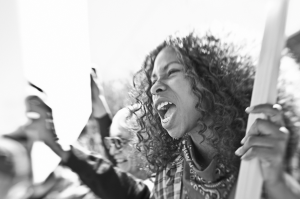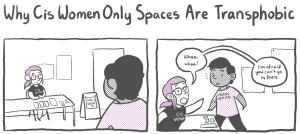
Two people sit on a couch. In the background, one looks forward. The person in the foreground has their back to their partner, their hand on their head, looking upset.
(Content Warning: sexual violence)
Our justice system is not typically sympathetic to sexual assault and harassment survivors, to say the least. Many report being shamed by police, accused of lying in court, and bullied by their peers.
It is sympathetic to perpetrators, on the other hand.
99.4% of rapists avoid jail time, and groping isn’t even clearly illegal in some parts of the US.
The tendency to discount survivors’ stories and give perpetrators the benefit of the doubt extends to the rest of society – including the survivors and perpetrators themselves.
That’s why, when I’ve been spoken to and touched sexually in ways I didn’t want, I made excuses for my assailants, often at the expense of my own feelings.
Here are some ways I’ve excused inappropriate sexual behavior – and the troubling facts they reveal about our entire culture’s approach to sexual assault and harassment.
1. ‘He Was Too Caught Up in the Moment to Think Clearly’
During my early twenties, I had a boyfriend I now recognize as sexually abusive.
But at the time, I couldn’t think of him that way. That would call a relationship that meant the world to me into question.
So when I asked him to get a condom and he said “too late” and had sex with me anyway, I assumed that he was just being playful and that he didn’t realize I was serious about the condom.
When I said said “ow” during sex and he replied “I assume that’s a good hurt?” and kept going, I assumed my “ow” really was ambiguous.
And since I recognized that both those conclusions seemed pretty implausible, I decided he must have just not been thinking clearly because he was so caught up in the pleasure of the moment.
That idea was introduced by my therapist, who said it was “hard for men” to think clearly in the middle of sex.
If you love someone, though, it shouldn’t be “hard” to notice or care about their discomfort at any point. This excuse is a variation of one we use a lot to justify men’s wrongdoings: “Boys will be boys,” “Men can’t help it.”
By painting assault as a biological instinct, this way of thinking makes us unable to see the toxic masculinity, misogyny, and downright bad intentions that go into sexual abuse – and make us more lenient on abusers.
2. ‘He’s Just Trying to Be Totally Open and Honest’
Years after we worked together, a coworker got back in touch with me over Facebook chat, telling me how great I looked in my photos and how much he admired me. I liked the confidence boost, and we kept in touch for years via text.
When I was having a problem or feeling bad about myself, I knew he’d be there to tell me how awesome I was.
He was also there to send me the occasional unsolicited dick pic. And to tell me he’d thought about me while he masturbated. And to ask me about my sexual fantasies.
This got really confusing for me. I liked being able to talk about sex. Isn’t this what friends do? I asked myself. Don’t you appreciate openness?
But it seemed like he had ulterior motives – like he wanted to get more out of these discussions than just an exchange of thoughts.
I do appreciate open discussion about sex. But that’s different from outright hitting on someone.
There’s a line between being honest and being a creep, and people usually know when they’ve crossed it, because their motives are different.
An honest person is genuinely looking to hear what someone thinks. A creep is trying to gain sexual pleasure from the interaction.
So, desire for honesty doesn’t excuse being a creep – there are plenty of non-creepy ways to be honest. And showing someone a photo of your crotch out of the blue is not one.
3. ‘He’s Just Socially Awkward’
One Tinder date I met in San Francisco spent the evening repeating that I was “amazing.” When I asked what was so amazing about me, given that we’d just met, he said, “You’re giving me a mild erection.”
Typical tech guy, I thought. He must be so nervous that he’s blurting out the first thing that comes to his mind. Poor dude.
But there was something much more insidious at play, and by dismissing it as a result of awkwardness, I was contributing to the notion that sexual harassment by socially awkward people is forgivable, even charming.
I was also promoting a pretty bad stereotype of socially awkward people, given that I count myself among them.
During my time amid the tech community, this excuse came up time and time again.
These nerdy software developers, people would say – invoking a sexist stereotype that pervades the tech industry – just don’t understand what signals you’re sending.
There are plenty of socially awkward people who do respect boundaries, though. If you don’t know what signals people are sending, you can always ask.
Telling men, especially privileged men, that they can be forgiven for creepy comments or unwanted touches because they’re just socially inept is yet another way of instilling male entitlement.
4. ‘At Least He Didn’t Rape Me’
The week I moved to New York City, a man visiting from London asked me out in a Starbucks. I was infatuated with him and excited about this spontaneous date.
We went out twice during his visit, and after the second time, I didn’t want to say goodbye quite yet, so I came up to his Airbnb to help him pack. We started making out.
“I don’t want to go further than this, okay?” I asked.
Then he took off my shirt.
“No further,” I said.
He unhooked my bra anyway and ogled my chest.
As he put my hand on his crotch, I jumped up and told him I really wanted him to stop.
“Sorry,” he said. He knew he’d done something wrong.
“It’s okay,” I said. “You stopped.”
“I guess it’s a guy thing,” he replied, employing the “boys will be boys” excuse to exonerate himself.
When a situation is too unsettling to make sense of, we try to see the positive. And this case and many others, the positive I was able to see was that it never escalated to rape.
By reassuring him that he stopped, I was also reassuring myself that I had the power to make him stop, because I otherwise felt completely out of control in that situation.
I failed to prevent the unwanted touching from starting, but at least I had succeeded in “preventing” its continuation.
The problem is, this reasoning let me see not just the situation but also the person more positively.
If he could have raped me and didn’t, he was a good guy, I figured. Even if he had some work to do in the consent department, his heart must be in the right place.
This stems from the false assumption that there’s a hierarchy of sexual violations, with rape being the most traumatic.
In reality, it totally depends on the situation, and the harm done is not in the act itself, but in what it communicates: viewing the survivor as an object.
This objectification can occur in many different ways, including without rape.
The fact that someone “only” catcalled or kissed or sexted you without your consent doesn’t afford him Nice Guy status.
He didn’t do you a favor by sparing you the worst of it.
It wasn’t kind of him to stop. He shouldn’t have started in the first place.
5. ‘He Doesn’t Deserve Such Harsh Punishment’
After sleeping on the couch of a man I met through the site Couchsurfing, he sent me a series of texts telling me I had “such deep eyes” and that looking into them made him want to kiss me.
I told him I was uncomfortable, but I didn’t report him or write him a bad review.
That could render him unable to use the site, which he enjoys because it allows him to meet people from all over the world, I thought. Who was I to take that opportunity away from him?
Well, I was a victim of sexual harassment, that’s who I was.
He harassed me, yet I was feeling bad – even though reporting him could spare other women creepy texts like that.
The fact that his ability to use Couchsurfing trumped my own and other women’s comfort reflects a society-wide tendency to sympathize with perpetrators more than survivors.
When Brock Turner was convicted of sexual assault, for example, Judge Aaron Persky only gave him six months (which was reduced to three) because he feared a longer sentence would have a “severe impact” on him.
When survivors internalize this concern for the perpetrator, they also come to feel that they deserve punishment – one of many reasons most assaults go unreported.
***
I almost titled this article “5 Ways I’ve Downplayed My Own Sexual Victimization – And Why I’m Not Anymore.” But that would be dishonest, because I still do it.
I still keep in touch with my abusive ex-boyfriend and creepy ex-coworker. I never reported the Couchsurfing host. I make excuses for the misogyny of men I love.
I suppose I have a hard time conceiving of the fact that I’ve been violated so many times by people who didn’t have excuses, that there’s nothing to downplay it, that it really was that bad. That seems like too cruel a reality.
But that is the reality. The reality is that people have done inexcusable things to me.
And my experiences are not unusual at all. If you related to them, this might help you direct less of that blame toward yourself.
If reading them made you think, Shit, that thing that person did to me that I thought was okay really wasn’t, then this could help you define your experience.
We’re constantly looking for a silver lining in troubling situations, but by trying to find that lining in abusive people’s behavior, we’re letting them off the hook.
Perhaps, then, the best silver lining to find is in ourselves. The positive is that I’m using these experiences to remind people never to accept such treatment from others. It’s that I’ve been able to thrive despite them. And it’s that other people of all genders support these efforts.
This coping mechanism sympathizes with the survivor, not the perpetrator, and it doesn’t make the crimes seem less criminal.
[do_widget id=’text-101′]
Suzannah Weiss is a Contributing Writer for Everyday Feminism. She is a New York-based writer whose work has appeared in The Washington Post, Salon, Seventeen, Buzzfeed, The Huffington Post, Bustle, and more. She holds degrees in Gender and Sexuality Studies, Modern Culture and Media, and Cognitive Neuroscience from Brown University. You can follow her on Twitter @suzannahweiss. Read her articles here.
Search our 3000+ articles!
Read our articles about:
Our online racial justice training
Used by hundreds of universities, non-profits, and businesses.
Click to learn more



















